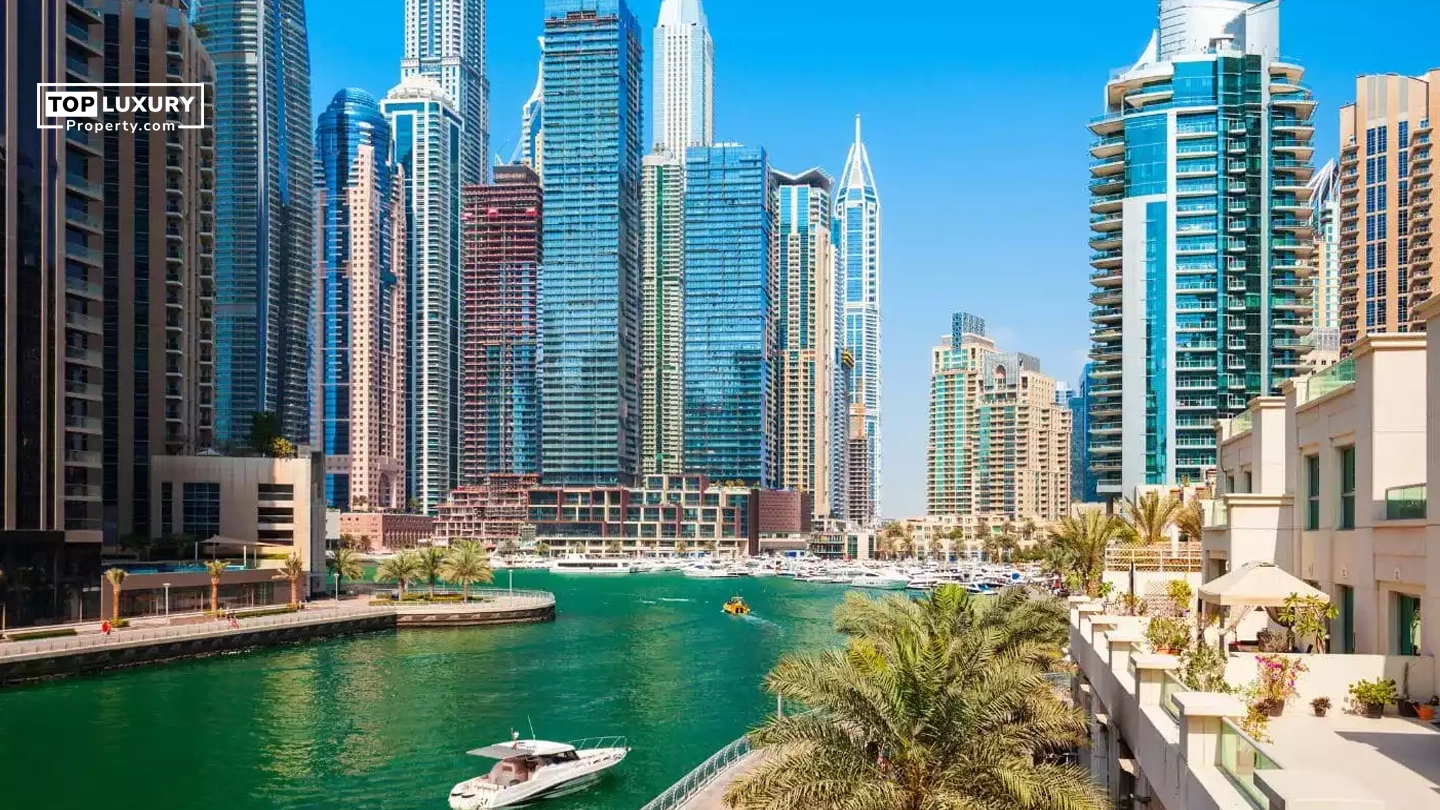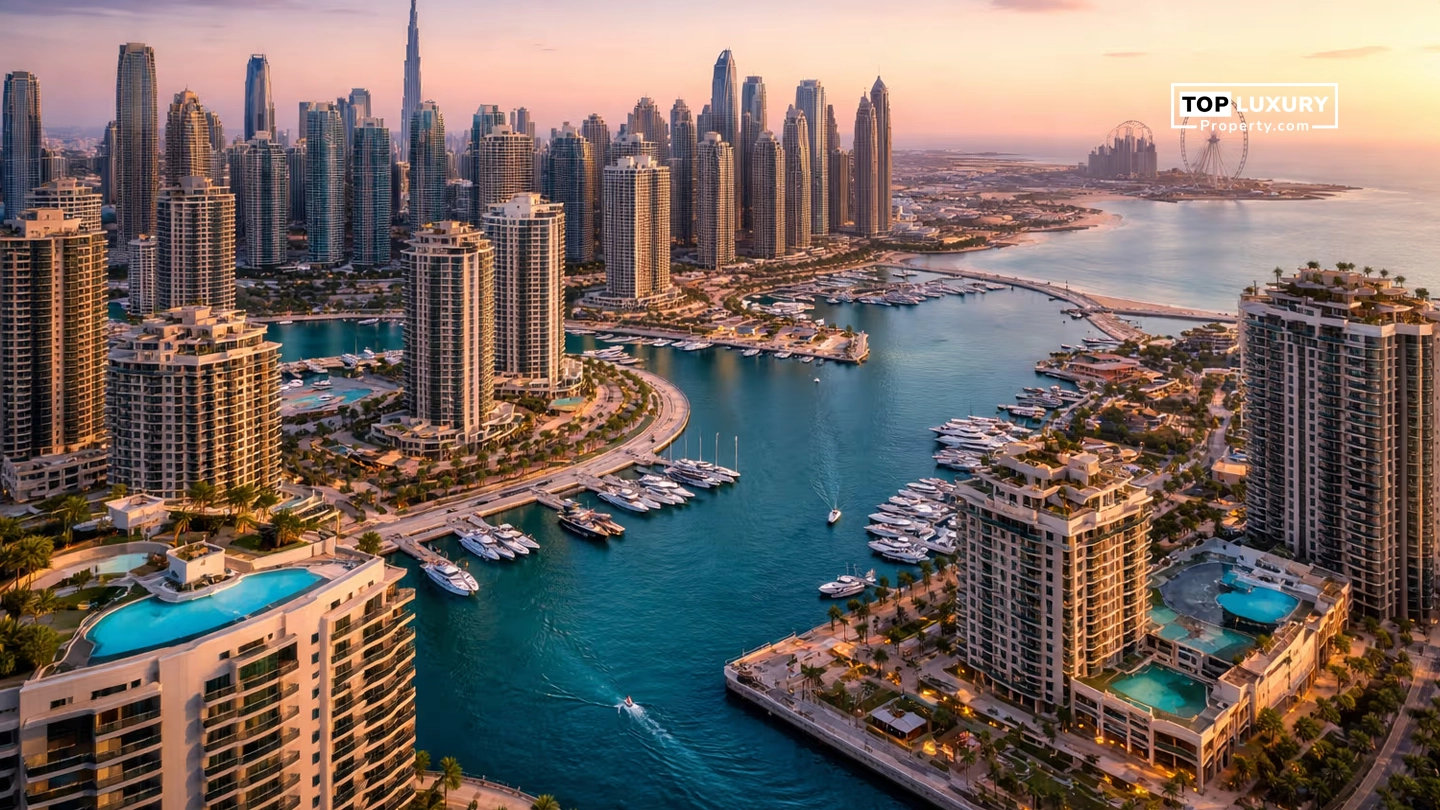Buying a property is a good decision but where to invest? This is a big question now. As a leading real estate agency, we have analyzed many regional real estate markets. Among them, the UAE real estate market is showing exceptional results. Local and global investors are rushing to get their share. The property market has seen record-breaking returns in recent years.
Real estate UAE transactions reached AED 239 billion in Q1 2025. In the micro-segment, Dubai already witnessed AED 144.7 billion transactions in Q2 2025. These numbers are changing how we view global real estate. The UAE is setting new standards for UAE property investment worldwide.
The Dubai Economic Agenda D33 & UAE’s digital economy strategy is transforming the property market. Here, we are going to analyze if 2025 is the right time to invest in UAE property.
Economic Stability and Growth in the UAE

The UAE has one of the world’s most dynamic economies. Economy Minister Abdullah bin Touq Al Marri shared some good news. The country’s GDP should grow between 5% and 6% in 2025. This growth comes from many strong sectors. Technology, renewable energy, and financial services lead the way.
The GDP grew at 4.8% annually between 2021 and 2024. Non-oil GDP grew even faster at 6.2% each year. Non-oil sectors now make up 75% of the national GDP. This shows a clear shift away from oil dependency. The UAE now has a more diverse economic model.
Vision-Led Growth Strategy
The “We the UAE 2031” vision has bold goals. It aims to double the national economy in ten years. The plan focuses on innovation and global partnerships. The UAE is exploring new economic opportunities worldwide. They’re building connections with Africa, Latin America, and Southeast Asia.
At the World Governments Summit 2025, Al Marri praised the UAE’s adaptability. The country excels at facing global economic challenges. It focuses on knowledge-based growth and strong governance. This makes the UAE perfect for long-term UAE property investment.
Dubai Economic Agenda D33
The Dubai Economic Agenda D33 is changing the economic landscape. It wants to double Dubai’s economy in the next decade. The agenda includes 100 transformative projects with clear goals:
- Double Dubai’s foreign trade to AED 25.6 trillion
- Increase foreign direct investment to AED 60 billion yearly
- Boost government spending to AED 700 billion
- Raise domestic demand to AED 3 trillion
- Drive AED 100 billion annually through digital transformation
The D33 agenda will help 30 local companies become global unicorns. It will support 400 SMEs to expand globally. This reinforces Dubai’s position as a leading global city.
Sovereign Wealth Funds and Capital Strength
The UAE has impressive financial resources through sovereign wealth funds. The Abu Dhabi Investment Authority manages USD 853 billion in assets. It’s the largest fund in the region and fourth-largest worldwide. Other major funds include:
- Investment Corporation of Dubai: USD 309 billion
- Mubadala Investment Company: USD 284 billion
- ADQ: USD 159 billion
- Emirates Investment Authority: USD 87 billion
These funds invest in infrastructure and global assets. They boost confidence in the UAE real estate market. Their financial power creates stability for property investors.
Expanding Digital Economy
The UAE plans to double its digital economy contribution to GDP. It should grow from 9.7% in 2022 to 19.4% by 2032. Several initiatives are making this possible:
- The UAE Strategy for the Fourth Industrial Revolution
- The National Programme for Coders
- Emirates Blockchain Strategy 2021
- Sandbox Dubai for tech pilot projects
These digital policies are making the UAE a global innovation hub. They enhance real estate through PropTech and AI-powered platforms. Blockchain now secures property transactions more effectively than ever before.
Strategic Location and Trade Connectivity
The UAE sits between Europe, Asia, and Africa. This makes it one of the world’s best trade hubs. Over 66% of the global population lives within eight hours by air. This makes the UAE ideal for international businesses and residents.
The country has more than 40 free zones with special benefits. These offer tax incentives and 100% foreign ownership. Companies can repatriate all profits without restrictions. This boosts demand for both commercial and residential properties.
Infrastructure and Government Spending
The UAE invests heavily in infrastructure development every year. In 2023, the federal government allocated AED 2.4 billion to infrastructure. They invest in roads, public transport, and smart cities. This spending supports property appreciation across all emirates. It attracts long-term investment to emerging areas across the country.
Key Factors Driving Property Investment Returns

Let’s explore the key reasons why UAE is leading the world property segment.
High Rental Yields and Steady ROI
Investors love the UAE for its high rental yields. Dubai alone generated AED 9.4 billion in rental income in Q2 2025. This shows strong tenant demand and low vacancy rates. Prime communities offer impressive returns to property owners.
Downtown Dubai, Dubai Marina, and Business Bay average 6%-8% rental yields. Emerging areas like JVC, Arjan, and Dubai South offer up to 9% annually. These numbers beat traditional markets in Europe and North America. Most Western markets yield below 4% on property investments.
The UAE has no property taxes or capital gains tax. This further increases UAE real estate ROI for investors. It makes the UAE one of the most profitable places for real estate investment.
Dominance of the Off-Plan Market
Off-plan transactions reached AED 98.4 billion in Q2 2025 in Dubai. They made up 68% of total real estate activity that quarter. Over 31,000 units were sold off-plan during those three months. This surge comes from attractive payment plans and future-ready communities.
Developers offer post-handover payment schemes to attract buyers. Many waive registration fees and create custom incentives. Off-plan investment appeals strongly to international buyers. They use favorable currency rates to secure assets in AED. These projects typically gain value quickly upon completion.
Digital Transformation and PropTech
The UAE’s digital-first approach has changed the property market completely. AI helps investors filter locations and assess prices more effectively. Blockchain secures land registries and digitizes property titles. This increases transparency for all parties.
Sandbox Dubai helps startups test and grow PropTech innovations. Virtual property tours let overseas buyers see homes remotely. Automated financing tools have improved transaction efficiency. These digital advances build investor confidence, especially from international buyers.
Investor-Friendly Policies and Long-Term Visas
Foreigners can buy freehold property without needing local sponsors. Investors who purchase property worth AED 2 million qualify for 10-year visas. These Golden Visas extend to family members and can be renewed. This has boosted demand from expats and global investors.
The UAE now allows full foreign business ownership in mainland areas. They’ve relaxed rules about money transfers to other countries. These policies make real estate UAE more attractive. The government welcomes innovation and foreign capital. This creates a safe environment for long-term property investment.
Infrastructure-Led Appreciation
New infrastructure projects drive price increases in nearby areas. The Dubai Metro Blue Line and new road networks boost property values. Communities along the Metro expansion see early price momentum. Areas like Dubai Silicon Oasis and Mirdif benefit directly.
In Abu Dhabi, island destinations are growing rapidly. Saadiyat Island and Al Reem offer luxury lifestyle options. They provide access to cultural landmarks and high-end retail. Government infrastructure investments increase surrounding property prices UAE. Location selection becomes critical for maximizing ROI.
Popular Regions for Real Estate Investment

The UAE property market analysis shows continued strong performance into 2025. Q1 2025 recorded over AED 239 billion in real estate transactions. This included Abu Dhabi, Dubai, Sharjah, Ajman, and Ras Al Khaimah. These numbers show strong investor confidence in the UAE market.
Dubai
Dubai remains the center of UAE property investment activity. In Q1 2025, the emirate saw AED 193 billion in transactions. This came from 58,039 deals, showing a 16.2% increase in value. Transaction volume rose 31.5% compared to the previous year.
Off-plan properties dominated Dubai’s market in recent quarters. They contributed AED 98.4 billion in Q2 2025 alone. This represents an 82.7% increase from Q1. Developers sold 31,699 off-plan units in just one quarter. Rental income reached AED 9.4 billion during the same period.
High-demand areas include Arabian Ranches and DAMAC Hills. Dubai Harbour and communities near the future Metro Blue Line are popular. Dubai attracts both end-users and investors seeking high returns. Long-term visas and flexible payment plans enhance its appeal.
Abu Dhabi
Abu Dhabi is emerging as a luxury real estate destination. Saadiyat Island, Yas Island, and Al Reem Island lead the market. Q1 2025 saw AED 25.3 billion in total transactions there. This represents a 34.5% increase from the previous year.
Branded residences have quadrupled in supply in Abu Dhabi. This drove a 158% jump in secondary luxury market volumes. New projects like SHA Wellness Residences attract global buyers. Waldorf Astoria Residences elevate Abu Dhabi’s global property profile.
Sharjah
Sharjah saw the strongest growth rate among smaller emirates. It recorded AED 13.2 billion in property transactions across 24,597 deals. This represents a 31.9% year-on-year increase in market activity. Strategic proximity to Dubai boosts Sharjah’s appeal to buyers.
Affordability in new mixed-use developments attracts mid-market investors. Sharjah offers better value than Dubai for many property segments. New urban developments are changing the emirate’s real estate landscape.
Ajman
Ajman reported AED 5.55 billion in total transactions in Q1 2025, a 29% year-on-year increase in market activity. Sales alone contributed AED 3.69 billion from 3,132 deals. Affordable pricing attracts first-time buyers and investors on budgets. Increasing urban development makes Ajman a key secondary market. Its proximity to Dubai offers convenience without premium prices.
Ras Al Khaimah
Ras Al Khaimah (RAK) is transforming rapidly as a property market. Off-plan sales surpassed AED 2.4 billion in Q1 2025. This came from more than 1,300 transactions in just three months.
Villa values averaged AED 1,145 per square foot in RAK. Apartment prices climbed 39% year-on-year to AED 1,684 per square foot. Branded residences like Ritz-Carlton projects attract global investors. Aston Martin developments bring luxury buyers to the emirate.
RAK’s tourism sector boosts its property market significantly. The emirate welcomed 308,000 hotel guests in Q1 2025. It has 28 new luxury hotels in the development pipeline.
Legal and Financial Considerations for Buyers

Foreign investors can fully own properties in designated freehold zones. The legal process for buying property UAE is transparent and well-regulated. Buyers need a valid passport and signed MoU to begin. A 10% deposit and due diligence checks are standard requirements.
Buyers must also consider several important factors:
- Title deed issuance through the appropriate land department
- Registration fees, typically 4% of the property value
- Mortgage approvals from UAE-based banks for financing
- Service charges that apply per square foot of property
Off-plan buyers should verify developer registration with RERA. Check that the project has a proper escrow account system. Independent legal consultation helps review contracts thoroughly. This protects your investment from potential problems later.
In Dubai, buyers benefit from unified licensing under D33. Digital identity verification speeds up the process. Sandbox Dubai initiatives streamline real estate transactions for everyone.
Risks and Challenges of Investing in UAE Property

The UAE property market analysis shows mostly positive trends. However, investors should know about certain risks:
- Market volatility can affect property values at times
- External economic pressures may impact the market
- Interest rate shifts can change investment calculations
- Global political instability sometimes affects buyer confidence
- Project delays occasionally happen with off-plan properties
- Oversupply exists in certain segments, especially mid-tier apartments
- Service charges in prime areas can reduce net rental yields
- Currency fluctuations affect international buyers’ returns
- Tenant management requires compliance with local regulations
To reduce these risks, conduct thorough due diligence. Work with RERA-approved brokers for all transactions. Consider diversifying investments across different emirates and property types.
Conclusion
The UAE real estate trends show a market that started 2025 with record-breaking performance. Q1 transactions exceeded AED 239 billion across all emirates. Dubai leads in both volume and value of property sales. Abu Dhabi’s luxury segment continues to grow impressively. Ras Al Khaimah’s lifestyle developments attract new investor groups.
Visionary initiatives drive the property sector’s continued growth. The D33 agenda and UAE Digital Economy Strategy lead the way. Enhanced visa regulations make long-term investment more attractive. The property sector enters a new era of tech-enabled growth.
UAE property investment offers compelling advantages to global buyers. High rental returns and low taxation appeal to income-focused investors. Strong legal frameworks protect buyer interests effectively. Premium lifestyle offerings attract luxury property seekers worldwide.







